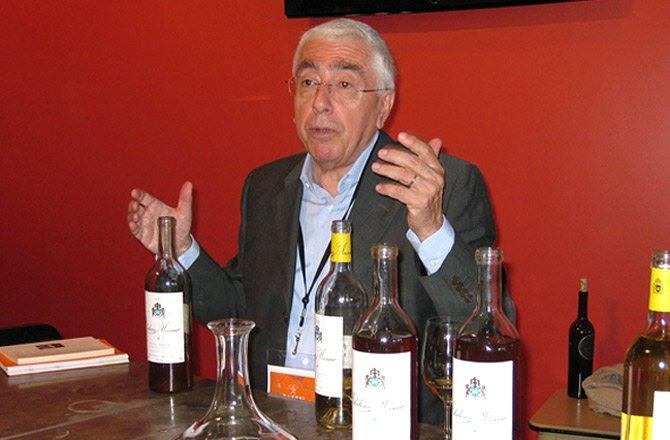Pioneering Lebanese Winemaker Succumbs
If you weren't a serious wine-lover, Château Musar probably sounded like a joke the first time you heard about it — a winery in Lebanon? Making pricey, and supposedly really good, wines? Once you tasted Château Musar, though, you'd understand why it commanded the high prices and the respect it got. It was — and is — a complex, elegant, racy wine, reminiscent of something excellent from Provence or the southern Rhône (the grapes, in varying proportions from vintage to vintage, are cabernet sauvignon, grenache, cinsault, carignan, and mourvèdre), but with a spicy earthiness that was very much its own. It also ages well, and has found a place, often in older vintages, on wine lists at some of the best restaurants in England, France, and elsewhere.
Gaston Hochar, who descended from a French family that had come to what is now Lebanon during the Crusades and stayed, studied winemaking in Bordeaux in the 1920s, and in 1930 founded Château Musar in the Beqaa Valley, east of Beirut (This corner of the Middle East is in fact one of the oldest wine-producing areas in the world, with vines first planted by the Phoenicians). Hochar's sons, Ronald and Serge, gradually took over the running of the winery in the late 1950s and early '60s, Ronald attending to the business aspects of the enterprise and Serge supervising the grape-growing and winemaking. Château Musar first attracted international attention after the 1979 Bristol Wine Fair in England, where the 1967 vintage was hailed as "the discovery of the Fair."
Serge became a celebrity in the wine world, attracting attention especially during the Lebanese Civil War in the 1980s, when he had to transport his grapes from his vineyards in the Beqaa to his winery in Ghazir, north of Beirut — in the process, he crossed the so-called Green Line, which separated the Muslims of western Beirut from the Christians to the east. More than one observer cracked that a hint of gunpowder could be detected in Hochar's wines from that era. In 1984, the leading British wine magazine, Decanter, named Hochar their first Man of the Year. He liked to say that wine superseded politics.
The Hochar brothers and their own sons (Ronald's is Ralph, Serge's are Gaston and Marc) continued to maintain the quality and reputation of Château Musar, which is known not just for its signature red wine but for an unusual white made from indigenous varieties called obaideh and merwah, and for a series of younger, less expensive wines, including a superb rosé. Musar is also given credit for having spurred the development of the modern-day Lebanese wine industry; today, such Lebanese labels as Château Kefraya, Château Ksara, Massaya, and Domaine Wardy are found on wine lists all over the world.
On New Year's Eve 2014, on vacation with his family in Acapulco, Hochar died while swimming in the ocean. He was 75.
